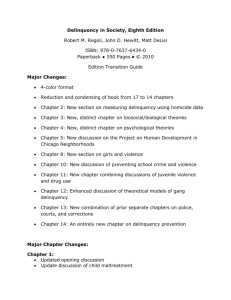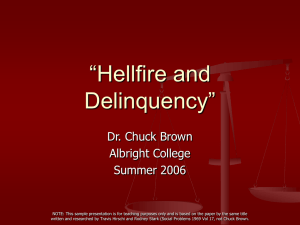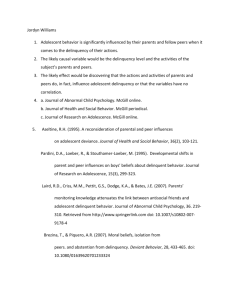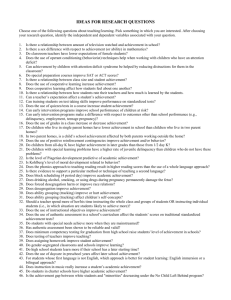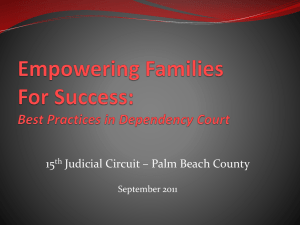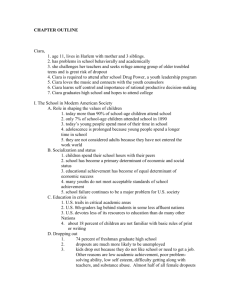Juvenile Delinquency - Wayland Baptist University
advertisement
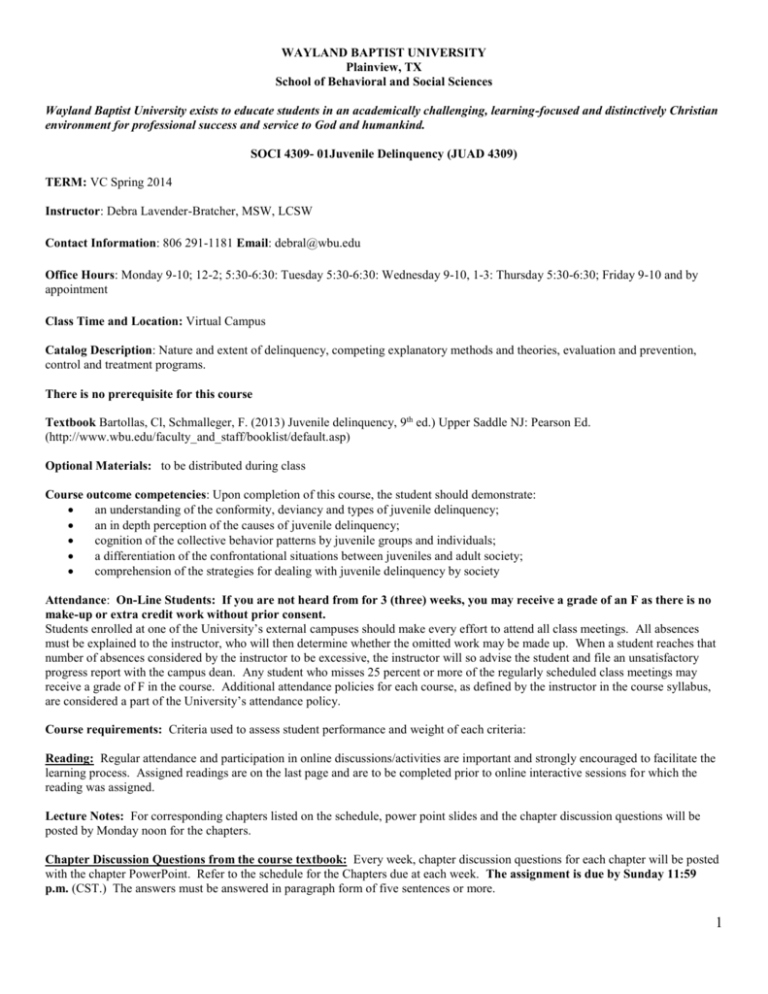
WAYLAND BAPTIST UNIVERSITY Plainview, TX School of Behavioral and Social Sciences Wayland Baptist University exists to educate students in an academically challenging, learning-focused and distinctively Christian environment for professional success and service to God and humankind. SOCI 4309- 01Juvenile Delinquency (JUAD 4309) TERM: VC Spring 2014 Instructor: Debra Lavender-Bratcher, MSW, LCSW Contact Information: 806 291-1181 Email: debral@wbu.edu Office Hours: Monday 9-10; 12-2; 5:30-6:30: Tuesday 5:30-6:30: Wednesday 9-10, 1-3: Thursday 5:30-6:30; Friday 9-10 and by appointment Class Time and Location: Virtual Campus Catalog Description: Nature and extent of delinquency, competing explanatory methods and theories, evaluation and prevention, control and treatment programs. There is no prerequisite for this course Textbook Bartollas, Cl, Schmalleger, F. (2013) Juvenile delinquency, 9th ed.) Upper Saddle NJ: Pearson Ed. (http://www.wbu.edu/faculty_and_staff/booklist/default.asp) Optional Materials: to be distributed during class Course outcome competencies: Upon completion of this course, the student should demonstrate: an understanding of the conformity, deviancy and types of juvenile delinquency; an in depth perception of the causes of juvenile delinquency; cognition of the collective behavior patterns by juvenile groups and individuals; a differentiation of the confrontational situations between juveniles and adult society; comprehension of the strategies for dealing with juvenile delinquency by society Attendance: On-Line Students: If you are not heard from for 3 (three) weeks, you may receive a grade of an F as there is no make-up or extra credit work without prior consent. Students enrolled at one of the University’s external campuses should make every effort to attend all class meetings. All absences must be explained to the instructor, who will then determine whether the omitted work may be made up. When a student reaches that number of absences considered by the instructor to be excessive, the instructor will so advise the student and file an unsatisfactory progress report with the campus dean. Any student who misses 25 percent or more of the regularly scheduled class meetings may receive a grade of F in the course. Additional attendance policies for each course, as defined by the instructor in the course syllabus, are considered a part of the University’s attendance policy. Course requirements: Criteria used to assess student performance and weight of each criteria: Reading: Regular attendance and participation in online discussions/activities are important and strongly encouraged to facilitate the learning process. Assigned readings are on the last page and are to be completed prior to online interactive sessions for which the reading was assigned. Lecture Notes: For corresponding chapters listed on the schedule, power point slides and the chapter discussion questions will be posted by Monday noon for the chapters. Chapter Discussion Questions from the course textbook: Every week, chapter discussion questions for each chapter will be posted with the chapter PowerPoint. Refer to the schedule for the Chapters due at each week. The assignment is due by Sunday 11:59 p.m. (CST.) The answers must be answered in paragraph form of five sentences or more. 1 Discussion Board: There are discussion board questions posted every week beginning Week 2, on March 4 by Tuesday noon. At least one discussion question will be assigned that will require students to share their ideas and concepts with other students. Students are encouraged to share constructive information with the instructor and fellow classmates. Students are required to respond to at least one other student by the following Monday by 11:59 p.m. (CST) to receive full credit weekly. Exams: The exams will be multiple choice, short answer and essay questions. The first exam will cover Chapters 1-4 and posted on Tuesday in week 3. The second examination will be posted on week 6 and over Chapters 5-9. The final examination will cover Chapters 10-16 and posted on Wednesday of the last week of the class. The tests will be posted on the blackboard. Course Requirements/Assignments: Written Project: Design or refine a program for prevention or intervention of juvenile delinquency. You will write a 6 - 10 page paper that will design a program that will prevent or control juvenile delinquency. See instructions on page 5. The paper due date April 28 (week 9) – MUST BE PUT THROUGH SAFEASSIGN DATES TO REMEMBER: everything is Central Daylight Savings Time Mondays by noon: Power Points, lecture note, chapter questions and discussion will be posted Sunday 11:59p: Chapter discussion questions due Monday 11:59: Discussion question due with two responses Examinations: Chapters 1 – 6, Week 4 Chapters 7 – 11, Week 8 Final: Chapters 12 – 15 Week 11 Paper due: April 28 Method of determining course grade: Grade Weight: (based on 900 points possible) Participation in Discussion Board: 100 points 10 points x 10 discussions Chapter Questions: 400 points: 16 question x 25 Project 1: 100 points First Quiz: 100 points Second Quiz: 100 points Final Exam: 100 points Grade Determination: A – 900 – 825 B = 824 – 750 C= 749 – 675 D = 674- 550 F= 549 and below Service for the Disabled: In compliance with the Americans with Disabilities Act of 1990, it is the policy of Wayland Baptist University that no otherwise qualified person with a disability be excluded from participation in, be denied the benefits of, or be subject to discrimination under any educational program or activity in the university. The Coordinator of Counseling Services serves as the coordinator of students with a disability and should be contacted concerning accommodating requests at (806) 291-3765. Documentation of a disability must accompany any request for accommodations. Course requirements: 2 The University has a standard grade scale: A = 90-100, B = 80-89, C = 70-79, D = 60-69, F= below 60, W = Withdrawal, WP = withdrew passing, WF = withdrew failing, I = incomplete. An incomplete may be given within the last two weeks of a long term or within the last two days of a microterm to a student who is passing, but has not completed a term paper, examination, or other required work for reasons beyond the student’s control. A grade of “incomplete” is changed if the work required is completed prior to the last day of the next long (10 to 15 weeks) term, unless the instructor designates an earlier date for completion. If the work is not completed by the appropriate date, the I is converted to an F. Instructor's policy on Academic Dishonesty: Wayland Baptist University students are expected to conduct themselves according to the highest standards of academic honesty. Academic misconduct for which a student is subject to penalty includes all forms of cheating, illicit possession of examinations and examination materials, forgery or plagiarism. A student caught for academic misconduct is subject to disciplinary action. Tentative Schedule; Week 1 - February 24 Chapter 1 – Adolescence and Delinquency Chapter 2 –Measurement & Nature of Delinquency Chapter 1 and 2 questions Week 2 – March 3 Chapter 3 – Individual Causes of Delinquency Chapter 4 – Social Structural Causes of Delinquency Chapter 3 and 4 questions Discussion Board #1 Spring Break March 10 - 14 Week 3 – March 17 Chapter 5 – Social Process Theories of Delinquency Chapter 6 – Social Interactionist Theories of Delinquency Chapter 5 and 6 questions Discussion Board #2 Week 4 – March 24 Chapter 7 – Gender and Delinquency Discussion Board #3 Quiz: Chapters 1 - 6 Week 5 – March 31 Chapter 8 – Families and Delinquency Chapter 9 – Schools and Delinquency Chapter 8 and 9 questions Discussion Board #4 Week 6 – April 7 Chapter 10 – Gangs and Delinquency Chapter 10 questions Discussion Board #5 Week 7 – April 14 Chapter 11 – Drugs and Delinquency Chapter 11 questions Discussion Board #6 Easter Break April 18, and April 21 Week 8 – April 22 Chapter 12 – Prevention and Delinquency Chapter 12 questions Discussion Board #7 Quiz: chapters 7 -11 Week 9 – April 28 Chapter 13 – Juvenile Justice Process Chapter 14 – Police and the Juvenile Chapter 13 and 14 questions Discussion Board#8 3 Week 10 – May 5 Chapter 15 – Juvenile Court Chapter 16 – Juvenile Corrections Chapter 15 and 16 questions Discussion Board #9 Week 11 – May 12 Final due May 16 Discussion Board #10 Semester ends May 17 Additional Information: WRITTEN PROJECT The 6 – 10 page computer generated paper will design or refine a program for the prevention or control of juvenile delinquency. The paper is written in APA style and with a cover page and include: I. Introduction - summarize the problem, target group, and goals for your program II. Current state of knowledge – you may use the articles to discuss the problems and possible solutions III. Theoretical rationale for your program – summarize the delinquency theory for which you will base your program and how this theory applies to your program IV. Program narrative - describe the programs day to day operations in concrete terms. Discuss referral, outreach, eligibility requirements, duration in the program, and other factors V. Goals and Objectives - state the measure program outcomes (e.g., decrease unemployment, decrease teen pregnancy, increase self-esteem, etc.) VI. Conclusion – briefly summarize your proposal VII. References – you may use the text, the three articles from you annotated bibliography but also use other references 4 5
